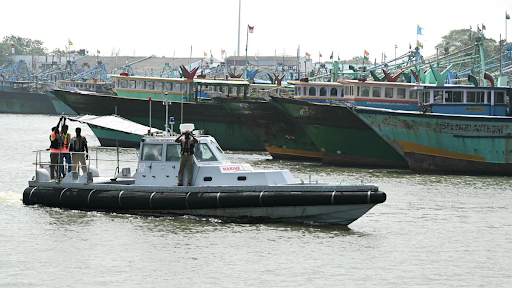




Source: NEWS18
Disclaimer: Copyright infringement not intended.
The Philippines recently confirmed the deployment of the US anti-ship missile system NMESIS during this year’s Balikatan military exercises.
Developed for the US Marine Corps (USMC) to enhance land-to-sea attack capabilities.
Supports the US Navy in neutralizing maritime threats from land-based platforms.
Components
Missile: Naval Strike Missile. Raytheon Missiles & Defense (USA) and Kongsberg Defence & Aerospace (Norway) jointly manufacture it.
Vehicle: Unmanned variant of Oshkosh Joint Light Tactical Vehicle.
Ground Platform
Called Remotely Operated Ground Unit for Expeditionary Fires (ROGUE Fires).
Manufactured by Oshkosh Defense, USA.
Control System
Not fully autonomous. Though the launcher vehicle is unmanned, the fire control is manually operated by a marine.
Autonomy is limited to vehicle navigation; missile launch and targeting decisions are human-controlled.
Features of NMESIS
Uses a highly mobile, unmanned ground vehicle based on the JLTV platform.
Designed for rapid deployment and operations from expeditionary bases.
Low radar signature.
Operates from dispersed land-based positions reducing vulnerability.
Can be easily integrated with broader joint and allied forces operations.
A multi-mission cruise missile capable of engaging both sea and land targets.
Can strike targets over 100 nautical miles away.
Flies close to the surface to evade radar detection.
Capable of complex flight patterns to avoid interception.
Equipped with an advanced passive seeker for high-precision targeting. Enhances effectiveness against moving and defended targets.
Carries a 226.79 kg-class warhead.
Equipped with a programmable fuse for different types of target destruction (surface burst, delayed detonation, etc.).
Uses GPS-aided Inertial Navigation System and terrain mapping to accurately reach the target.
Enhances the USMC's expeditionary capabilities.
Acts as a deterrent against hostile naval forces especially in contested areas like the South China Sea.
Strengthens the Philippines-US military cooperation particularly in the context of rising maritime tensions in the Indo-Pacific.
Sources:
|
PRACTICE QUESTION Q. With reference to the Navy-Marine Expeditionary Ship Interdiction System, recently seen in the news, consider the following statements:
Which of the statements given above is/are correct? (a) 1 and 2 only Answer: (b) Explanation: Statement 1 is incorrect. NMESIS uses an unmanned ground vehicle but fire control (targeting and firing) is human-operated not fully autonomous. Statement 2 is Correct. The Naval Strike Missile is jointly developed by Raytheon (USA) and Kongsberg (Norway). Statement 3 is Correct. NSM is a multi-mission cruise missile capable of attacking both maritime and land targets with high precision. |






© 2026 iasgyan. All right reserved